Organic click-through rate is one of the most important SEO metrics.
Why?
Because a high CTR means that your content resonates with your audience and they click through to your website from search engine results pages.
This post will cover what it’s important, and how you can improve it to increase the number of organic clicks.
Contents:
What Is Organic Click-Through Rate?
Organic CTR is the percentage of users who click on your listing in the search engine results pages, divided by the total number of impressions.
For example, let’s say your content is ranking number three for a specific keyword:
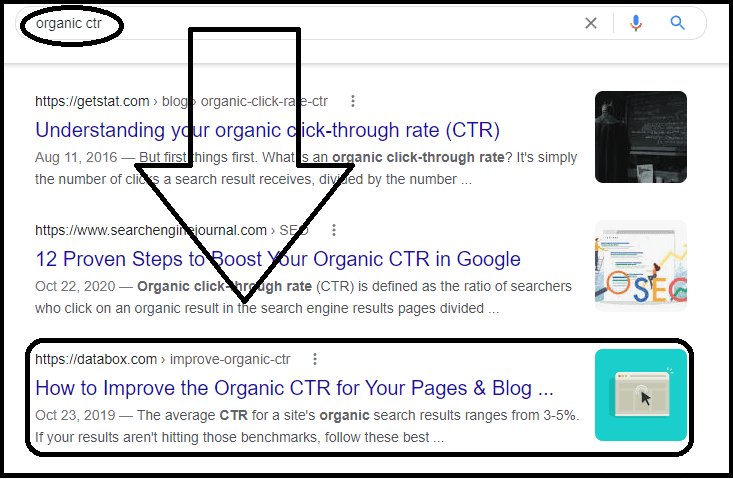
If it appears 100 times in the SERPs and gets clicked on 10 times, your organic CTR would be 10 percent.
Why Is Organic CTR Important?
If you are serious about SEO, you need to understand how users interact with your content.
A high organic CTR is essential because it indicates that your listing is relevant and appealing to searchers.
It also means that you’re more likely to rank higher in the SERPs, which can lead to even more clicks and organic traffic.
And, of course, more clicks mean more potential customers or clients for your business.
Larry Kim has written an article at Moz, where he explains the direct correlation between organic click-through rate and search engine rankings:

While Rand Fishkin tweeted about what an engineer at Google stated:
Next time I hear a Googler say "we don't use query/click data in rankings," I'm pointing to https://t.co/qETZpGEbm9 pic.twitter.com/m9DO3cBVXb
— Rand Fishkin (follow @randderuiter on Threads) (@randfish) March 17, 2016
Does it look complicated?
✅ Put simply, it means that Google (thanks to RankBrain) monitors organic CTR to understand user’s behavior in SERPs.
And it does not end here.
Larry Kim stated that there are a few things you can do to increase the organic click-through rate.
Among them, improving other user engagement rates, such as:
- Dwell time
- Time on site
- Bounce rate

Also, it’s important to point up that organic CTR is heavily connected to the featured snippets:
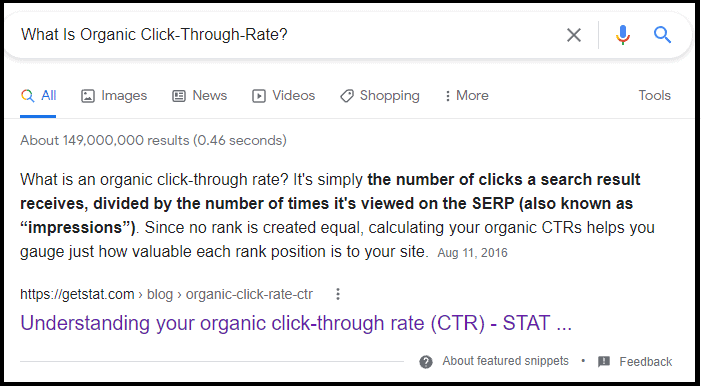
In fact, Hubspot saw an increase of over 114% when its content appeared as a featured snippet.
✅ To confirm all this, take a look at this tweet by the Search Public Liaison Danny Sullivan, who has written that Google is watching clicks to evaluate results quality:
Google confirms watching clicks to evaluate results quality. FYI Google still won't say if clicks used as rank signal pic.twitter.com/jzNGc5reQk
— Danny Sullivan (@dannysullivan) March 25, 2015
What Is The Average Click-Through Rate?
The FirstPageSage team conducted research in 2022 and found out that the first position in Google rankings generates a CTR of 39,6%.
While the second position makes the half (18,4%), the third one takes just 10,1% of all organic clicks:
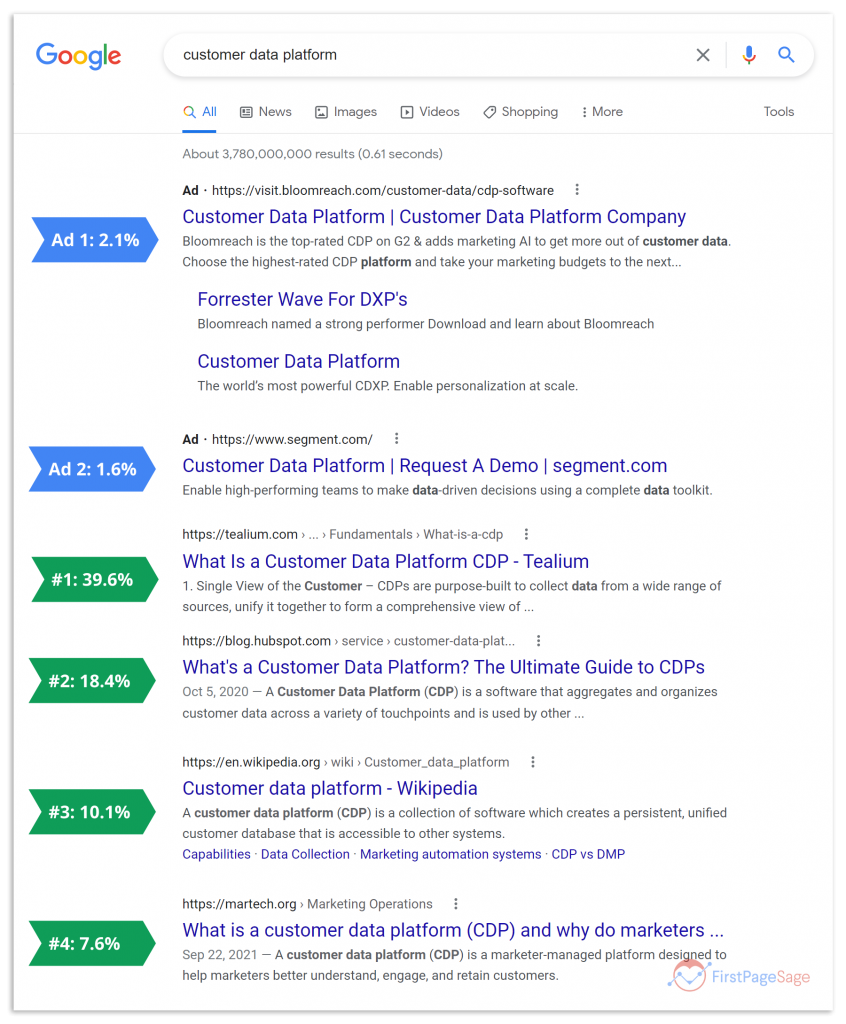
And here are the remaining spots, from 5 to 10, if you want to check them out.
For example, position #5 gets just around 5% of all clicks.
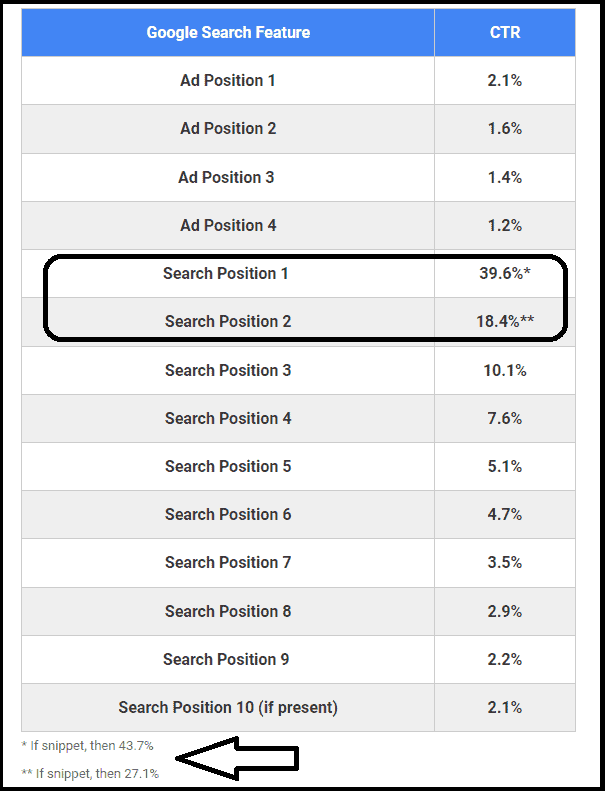
Note that the first position, if shown as a featured snippet, generates a stunning 43,7%!
In fact, as stated by Sistrix, when there’s a featured snippet in the search engine result, the organic CTR for position one decreases by an average of 5%:
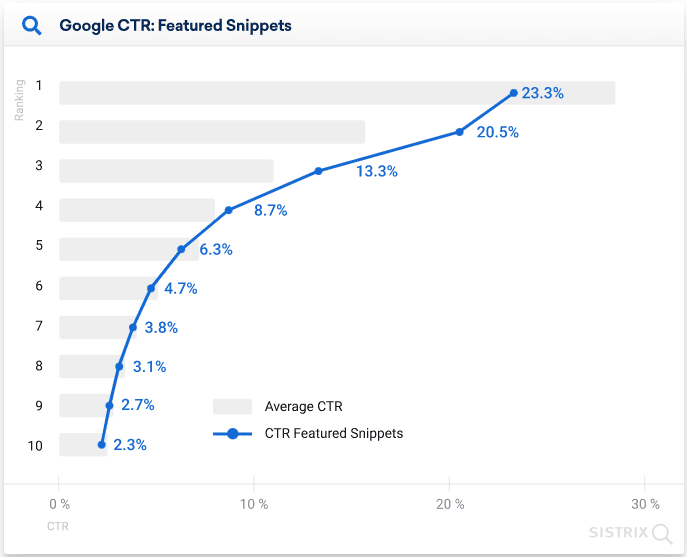
💡 Organic CTR is also changing based on the SERP features:
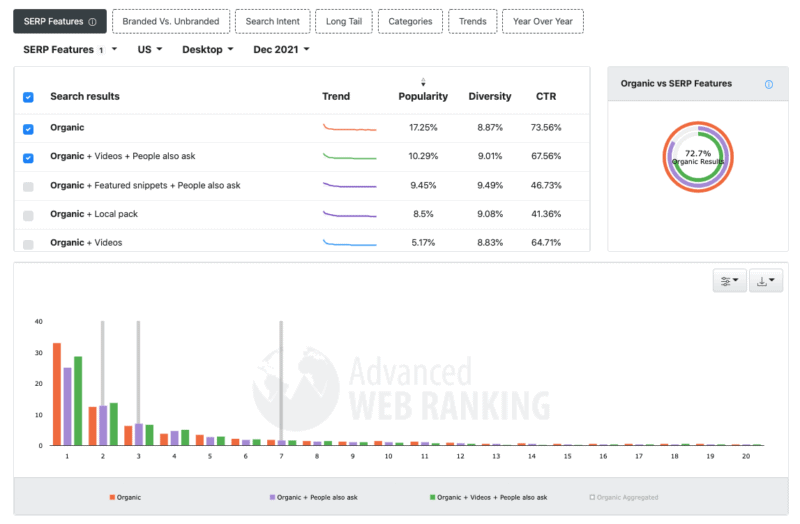
How to Measure Your Organic CTR
Now that you know what is the average organic CTR, you may be wondering how you can measure your click-through rate.
Fortunately, you can use Google Search Console, and find your website data by visiting the “Performance” tab:
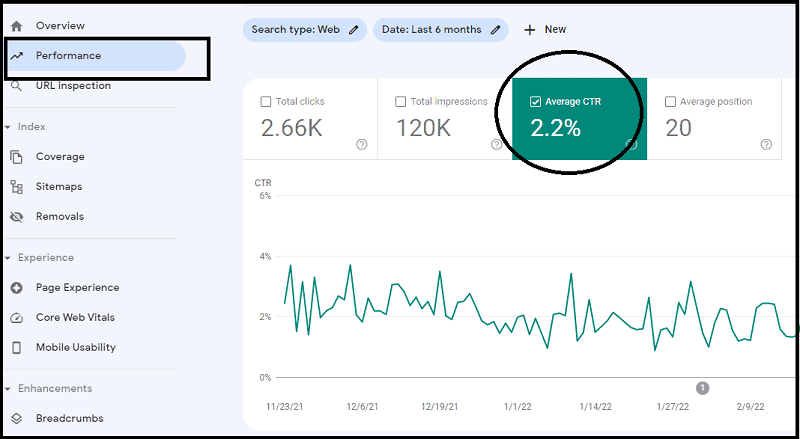
Below the graphic, you can see all your web pages with the specific percentage:
![]()
Now, an interesting thing you can do is to filter the pages to find the ones with low CTR and try to fix them.
For example, you may want to look at pages that get a lot of impressions, but not so many clicks:
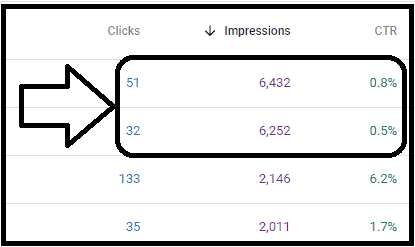
And use some refreshing strategies, to revitalize your content.
How to Improve Organic Click-Through-Rate
There are a few things you can do.
Try to implement these strategies:
- Focus on Improving Title Tags
- Optimize Your Content for Featured Snippets
- Use Short and Attractive URLs
- Experiment Using Brackets In The Title
- Try Using Numbers In Your Title
- Optimize Your Meta Description
- Add the Year To Your Title
- Do Not Use Clickbait
- Sparkle Emotion
- Use Rich Snippets and Sitelinks
Focus on Improving Title Tags
Your title tag is the blue clickable link in the SERPs that searchers see before they click through to your website.
It’s also one of the first places people look when they’re trying to decide whether or not to click on your listing.
That’s why it’s so important to make sure that your title tags are relevant, appealing, and keyword-rich.
✅ For example, my listicle about the best SEO Chrome extensions is doing great on Google!
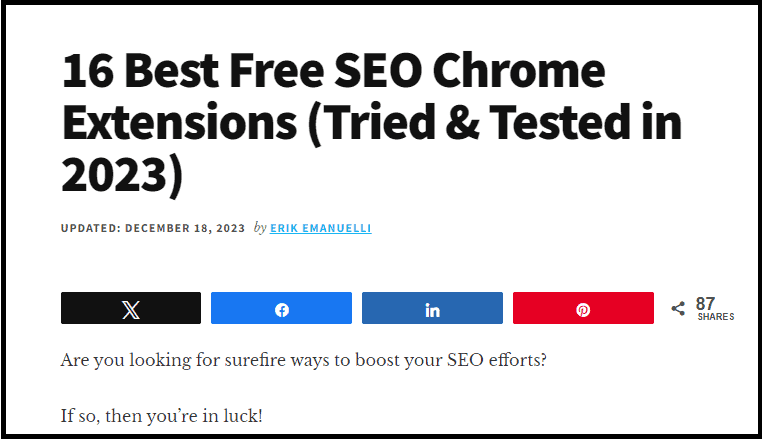
Optimize Your Content for Featured Snippets
Featured snippets are short answers to users’ questions that appear at the top of the SERPs.
They’re designed to give searchers quick and easy answers to their queries without having to click through to a website.
And, if you can get your content featured in a featured snippet, you’re likely to see a significant increase in organic CTR.
To optimize your pages for them, start by identifying the questions that people are asking about your industry.
Then, create something that directly answers those queries.
Make sure that your content is well-written and easy to understand. Avoid duplicate pages and keyword cannibalization.
And, most importantly, make sure it’s better than the competition.
💡 Usually, that information is gained from experience. Share case studies, examples, and real-life customer stories. That’s the type of thing Google likes to reward.
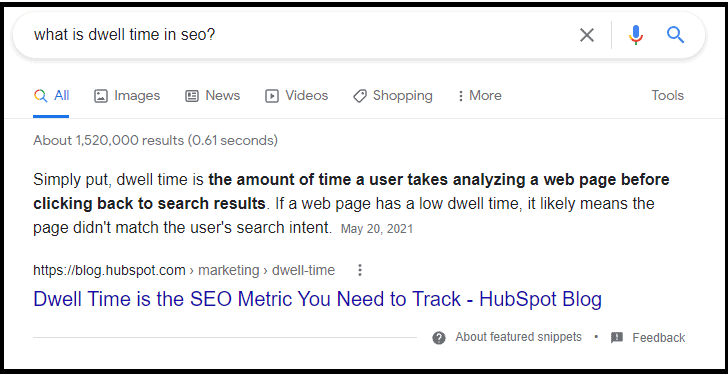
Use Short and Attractive URLs
When it comes to URLs, shorter is always better.
In fact, according to Backlinko, using shorter URLs may result in slightly better rankings.
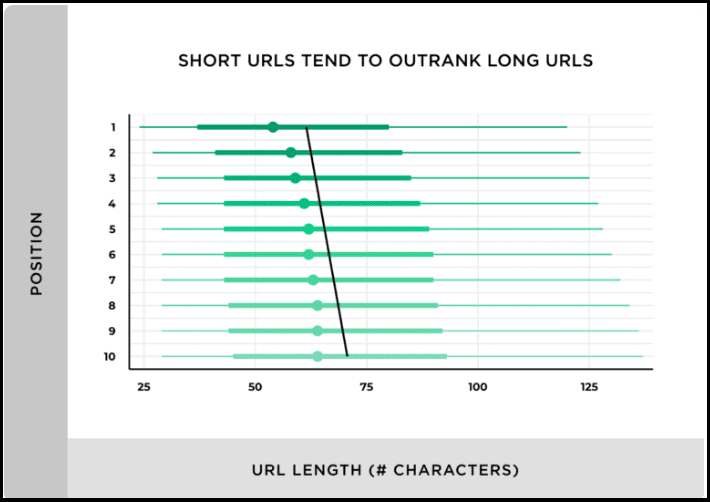
That’s because long, complicated URLs are often seen as less trustworthy by searchers.
And, of course, if people don’t trust your website, they’re not going to click on it.
So, make sure to keep it simple, keyword-rich, and attractive.
Experiment Using Brackets In The Title
For example, if you’re ranking for a competitive keyword like “SEO,” you could try something like this:
“The [Ultimate] Guide to WordPress SEO.”
Or, if you’re a local business, you could try something like this:
“[City] SEO Company.”
✅ Ultimately, using brackets in your title tags can help your content stand out from the competition in the SERPs.

Try Using Numbers In Your Title
For example, you could test something like this:
The Top SEO Tools of 2020
Or
The [Ultimate Guide] to SEO: 50 Tips to Boost Rankings
👉 Including numbers in your title tag is a great way to make your listing stand out.
Optimize Your Meta Description
Your meta description is the short description of your page that appears under the title tag in the SERPs.
While it doesn’t directly impact your organic CTR, it can indirectly affect it by helping you improve the click-through rate of your listing.
So, make it relevant, keyword-rich, and appealing:

You can even use LSI keywords when they fit naturally within the text.
And, most importantly, be sure that they accurately reflect the content on your page.
If people click through to your website and find that the content doesn’t match the description, they’re likely to bounce back to the SERPs and click on another listing.
✅ Respect the expectations of your users!
Add the Year To Your Title
If you’re writing a post about something time-sensitive, like SEO tips for 2023, be sure to include the year in your title tag.
This will help ensure that people know that your content is relevant and up-to-date.
For example, I added the year in my on-page SEO guide:
On-Page SEO: The Complete Guide (2024)
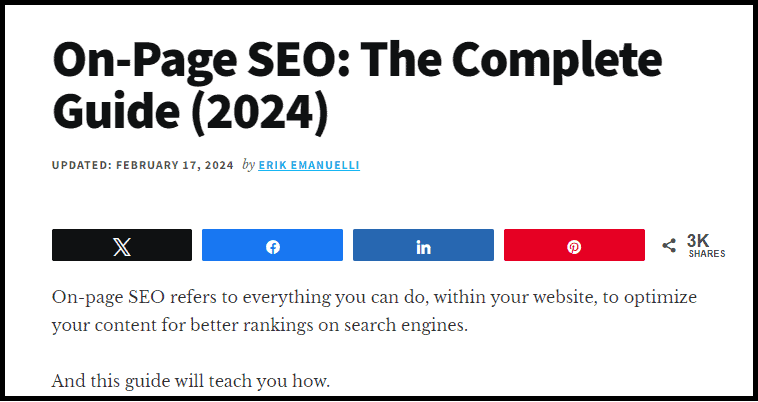
Do Not Use Clickbait
Clickbait is a type of title that’s designed to get people to click on a listing without actually providing any useful information.
Examples of clickbait titles include:
- You Won’t Believe What Happened Next
- This One Simple Trick
- Find Out How [Celebrity] Lost [X Number] Pounds
While clickbait can be effective in getting clicks, it’s not likely to improve your organic CTR in the long run.
That’s because people will quickly realize that they’re being tricked into clicking on a listing, and they’ll be less likely to click on your listings in the future.
So, while it may be tempting to use clickbait titles, it’s best to avoid them altogether.
Take for example this article:

If someone clicks it on the SERP and visits the site, he will quickly notice there’s almost no content, with a call to action to subscribe to a link-building service.
So, what will he likely do?
Click the back button on the browser right away, or close the web page.
This behavior will kill the dwell time and dramatically raise the bounce rate, which signals to Google that the content is not worth that position in the SERPs.
💡 Long story short: try to sell your content, but don’t overdo it!
Sparkle Emotion
If you can make people feel something when they see your listing, they’re more likely to click on it.
For example, if you’re writing a post about a sad or emotional topic, you could try using a title like this:
The Heartbreaking Story of [X]
Or, if you’re writing a post about something sure to make people laugh, you could try using a title like this:
The Funniest SEO Jokes of 2020
Emotional titles are often very effective in getting clicks, so don’t be afraid to experiment with them.
You can also use the bucket brigade technique to add an emotional punch to your title tags or meta descriptions.
Use Rich Snippets and Sitelinks
Rich snippets are special types of listings that include additional information, like images, ratings, and prices.
While sitelinks are links to other pages on your website that appear under your listing in the SERPs:

Both of them can help your listing stand out, improve organic CTR, and entice users to click on it!
To learn more about how to use rich snippets, check out this link.
Organic CTR FAQs
Q: Is organic CTR better than paid CTR?
A: It depends on your goals. Paid search ads can provide immediate visibility and drive more traffic to your website faster, but organic CTR generally has a longer-term impact and will help you build sustainable long-term growth.
Q: What is the average organic CTR on Google?
A: The average organic CTR on Google is around 3/5%, but it can vary depending on your industry, keywords, and other factors.
Q: Does organic CTR impact SEO rankings?
A: Yes, organic CTR is one of the ranking factors that can influence your SEO. A higher score signals to Google that your content is worth featuring prominently in the search results.
Before You Go
Organic CTR is an important SEO metric to track because it can give you insights into how well your website is performing in the SERPs.
However, optimizing the user experience does not end here.
It would help if you made sure that visitors stay on your site for a long time:
Also, you should guarantee that your pages are loading quickly, and optimized for mobile devices:
Now, it’s over to you.
Do you have any questions about organic CTR?
Let me know in the comments below!
And don’t forget to share the article, if you liked it!

Thanks Erik, I have not heard of trying brackets in the title for getting into featured snippets. I wonder why that is ? How about FAQ’s? Do they help at all? Thanks for the tips and tricks in this post.
Yes, Lisa.
FAQ can help with featured snippets because they often cover common questions and answers in a concise, easy-to-read format. This makes them a good resource for users looking for information on a specific topic, and also helps to improve your site’s visibility in search results.
I appreciate you stopping by and thanks for leaving your comment.
Hi Erik,
Once again you nailed it. This article is standalone sufficient to understand everything about CTR. Many bloggers including me often get low CTR, and this guide will definitely help us to improve the organic CTR.
I know some of the tips mentioned here but some are new to me and I’ll implement and test all of them.
Thanks for sharing.
-Nitin Dabas
Hi Nitin,
thanks a lot for your positive feedback.
I hope some of these tips can help you improve your organic CTR.
Hello Erik,
Increasing CTR is very important to boost conversions. You have shared some helpful and practical tips to improve organic CTR. Thanks for sharing it with us all.
Regards,
Vishwajeet Kumar
Thanks for visiting and commenting, Vishwajeet!
Thanks for sharing this – really helpful.
Good to hear it, Sarah.